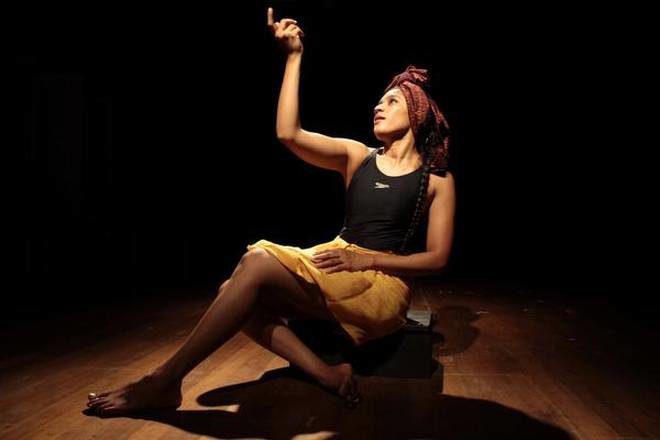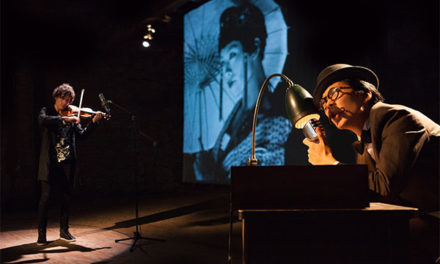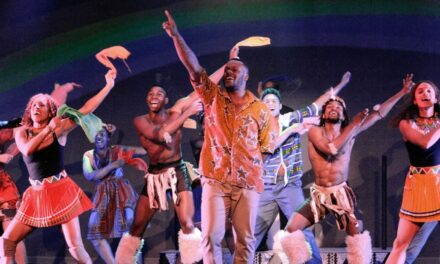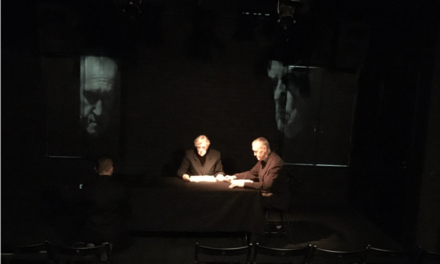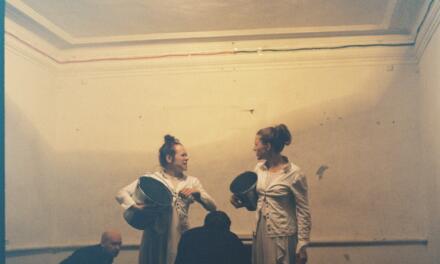The 10th edition of ITFoK touches upon diverse themes such as gender, identity, displacement, and sexuality among other subjects.
Those living on the margins are not always powerless. Neither are their lives empty. They often come up with powerful statements of their existence and their voices are strong and sharp. And they find expressions through all forms of creative expression, especially theatre.
The 10th International Theatre Festival of Kerala (ITFoK), organized by the Kerala Sangeetha Nataka Akademi (KSNA), brought to the theatre audience of Kerala a fine cross-section of the voices from the margins that seek their expression through the means of theatre and performance art. The theme of the festival is “Reclaiming the Margins.”
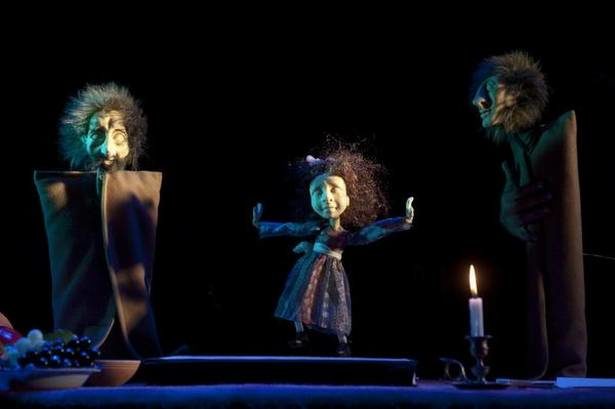
The Power Of Lullaby. Press photo
The 10th edition of the festival, which began in 2008, had a line-up of 33 performances, representing 14 countries, including India, spread over 10 venues in different parts of Thrissur town for 10 days. ITFoK 2018 was headed by a three-member panel of festival directors that includes M.K. Raina, one of the senior-most theatre persons in India and an alumnus of the National School of Drama, Chennai-based Rajiv Krishnan, whose theatre group Perch comes up with powerful productions, and S. Sunil, assistant professor at School of Drama and Fine Arts, Thrissur.
“The plays were selected through a democratically done selection process,” said Raina. “The theme was there, but we pushed the boundaries of the ‘margins,’ to include a wide range of regions and issues.” He said that subtitles in Malayalam and English were given for the plays so as to reach a wider audience.
Rajiv Krishnan pointed out that the idea was to empower the marginalized and to look at plays that reflect themes that were not necessarily getting prominence. “The focus is on the power of those on the margins,” he sayid.
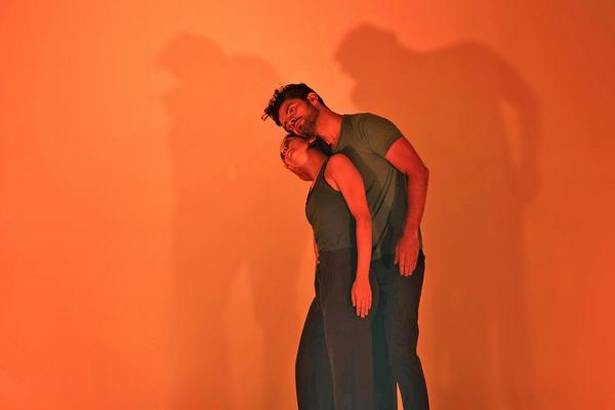
Say, What?. Press photo
The plays touched upon diverse themes such as gender, sexuality, the refugee crisis, caste, Islamophobia, identity, disability, myth, and memory, to name a few. “These plays, while engaging us, will also help us critically reflect on the times that we live in,” pointed out Krishnan.
“We were looking at diversity in form, content, and region, as much as possible. At the same time, rigor and quality of the plays were also an important consideration. The audience for ITFoK being an intelligent and discriminating one, we wanted to bring plays that would spark off a conversation and hopefully add to the understanding of the audience.”
The festival attempted to bring to the Kerala audience the new face of world theatre, says Sunil. Some of the plays were so highly political in their own countries that they had difficulty in getting support there.
The plays from Palestine, Iran, Poland, Chile, Egypt, Singapore, Switzerland, South Africa, Spain, Georgia, Sri Lanka, UK, and Wales explored the often unspoken and unknown atrocities from conflict-ridden scenarios the world over.
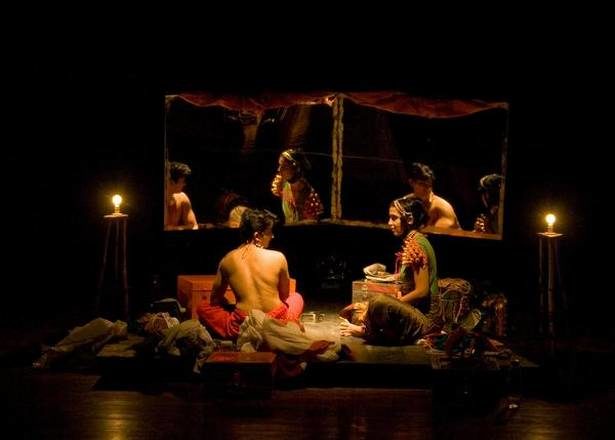
Akshayambara. Press photo
Kerala Sangeeta Nataka Akademi vice-chairman Xavier Pulppatt, executive committee member V.D. Prem Prasad, and an advisory panel made up of Mangai (Chennai), S. Surendranath (Bangalore), G. Kumara Varma (Kerala) and D. Reghoothaman (Kerala) were also part of the selection process.
There was a strong presence of women directors in this festival, with five out of the 10 national plays and six of the 16 international plays being directed by women. The solos directed and performed by Jyoti Dogra (Cup Of Tea), Maya Krishna Rao (Khol Do and Walk) and Nimmy Raphel (Nidrawathvam) were among the powerful works created in Indian theatre. Sharanya Ramaprakash from Bangalore (Akshayambara) and Avantika Bahl (Say, What?) were the other two women directors from India.
From the international scenario, there were Einat Weizman, the Israeli director and human rights activist, with her work, Palestine, Year Zero, which was also the opening play of the festival, Sophie Besse from the UK with her satirical take on the life of the inmates of the Calais camp, Borderline, Sara Matchett who has brought two plays, Walk: South Africa and Womb Of Fire, inspired by Mahaswetha Devi’s Agnigarbha, Egyptian theatreperson Laila Soliman Ahmed, with Zig Zig, and the Iranian theatre persons, Nazanin Sahamizadeh (Manus) and Azade Shahmiri (Voicelessness).
A wide range of human crises happening across the globe was brought to the Kerala audience in this festival. Palestine, Year Zero, focussed on the destruction of Arab homes by Israeli armed forces.
Described as a “documentary comedy,” the play had naturally drawn the ire of the Israeli authorities, with the Israeli Culture Minister Miri Regev ordering an assessment of the play prior to its staging at the Acre Festival for Alternative Theatre in 2016. Though Palestine, Year Zero, was not banned or withdrawn last year, Prisoners Of Occupation, another play by Weizman, was withdrawn from the same festival in 2017, following which various playwrights, directors, other artists and Israel Actors Union decided to boycott the festival.
The Iranian play, Manus, speaks of atrocities perpetrated upon immigrants who are detained at the Regional Processing Centre operated by the Australian government at the Manus Island in Papua New Guinea. Zig Zig from Egypt, directed by Laila Soliman Ahmed, retells the stories of 12 Egyptian women who were raped by British soldiers nearly 100 years ago. Say, What?, directed by Avantika Bahl, is a collaborative contemporary dance work created with Vishal Sarvaiya, a hearing-impaired performer. A soundless performance, it explores the world of people for whom sound does not exist.
Lal Batti Express (Red Light Express), a theatrical work created by children of sex workers of Mumbai, is part of the work being done by Kranti, a Mumbai-based NGO working among the women in Mumbai’s red-light area.
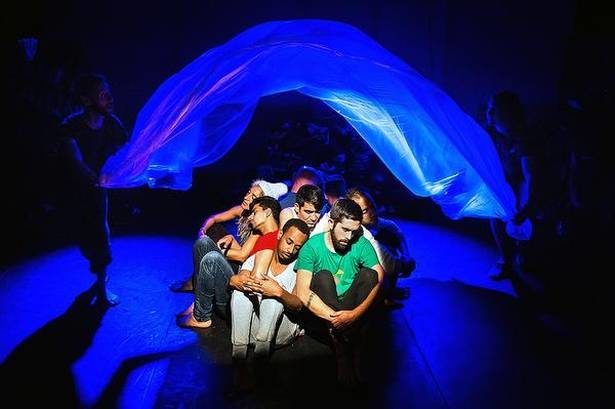
Borderline. Press photo
Rainbow Talk is another special performance that was staged on the opening night.
The festival also had a series of five seminars covering various topics such as Gendering Theatre, Theatre of Resistance, Cultures of Left Performance and Manifestations, Spectatorship, and Curation.
Traditional art forms such as Malabar Mappila Art Forms, Arjuna Nritham, Kanyar Kali, and Paliya Nrutham were also staged. A theatre workshop for transgender people was held at the School of Drama & Fine Arts, Thrissur as part of the festival.
Apart from the KT Muhammed Regional Theatre, Black Box and Bharat Murali Theatre within the Kerala Sangeetha Nataka Akademi premises and other venues within the campus, Jawahar Bal Bhavan, Palace Grounds and the School of Drama and Fine Arts were venues for the festival, with one play, The Greenman, from Spain, being performed on the streets.
“The Kerala Sangeetha Nataka Akademi took all possible steps to make the 10th edition of the International Theatre Festival of Kerala a truly memorable event,” said N. Radhakrishnan Nair, the KSNA secretary.
This article originally appeared in The Hindu on January 18, 2018, and has been reposted with permission.
This post was written by the author in their personal capacity.The opinions expressed in this article are the author’s own and do not reflect the view of The Theatre Times, their staff or collaborators.
This post was written by Renu Ramanath.
The views expressed here belong to the author and do not necessarily reflect our views and opinions.

